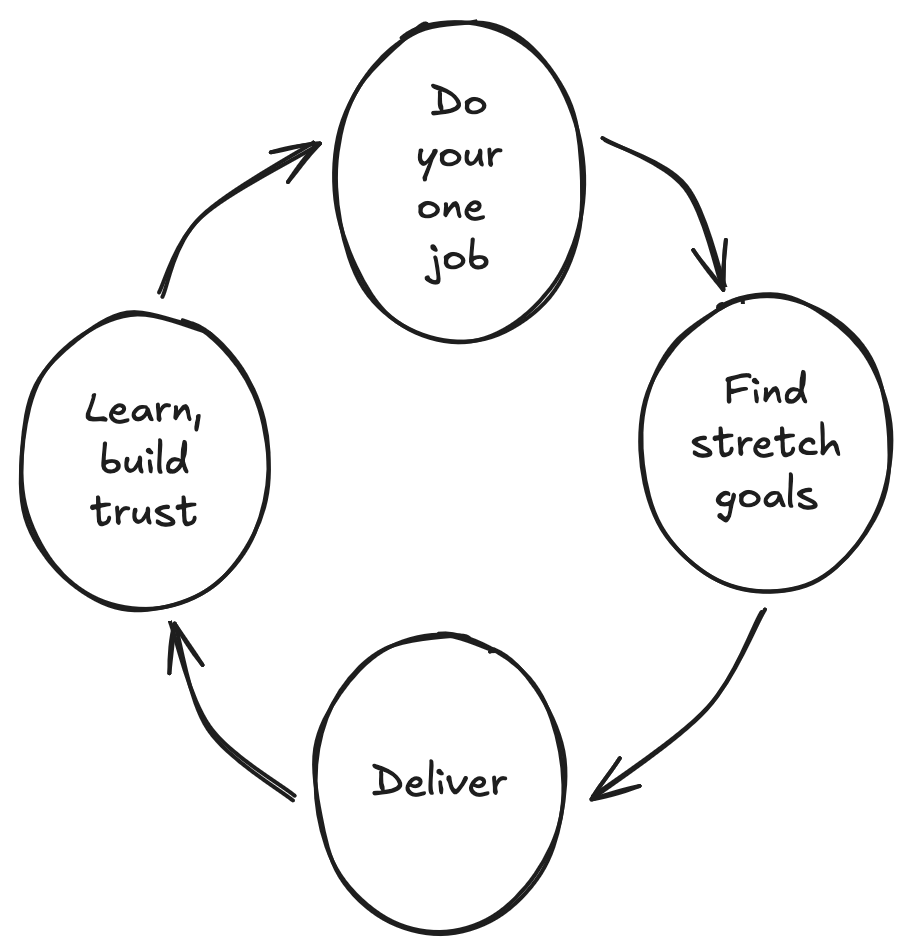Feedback Loops
Hey!
Welcome back to another week of musings.
I hope you had a good weekend, and managed to restore your energy for the first week of March!
Was this forwarded to you? You can subscribe here!
Things I discovered in the past week
I've been reading of Cell-based architecture recently, and found this recent article on Slack migrating to it, and Roblox.
I also came across this conversation between Uncle Bob and John Ousterhout around design philosophies. I fully recommend A Philosophy of Software Design, is a very insightful book.
As the review season ends and I see people updating their LinkedIn profiles, I think of feedback loops.
As professionals, we give and receive feedback throughout our careers, not only during review or promo seasons. The important aspect of feedback is how we can leverage it. Sometimes, feedback might be noise if there's not enough context behind it, or it might be direct but without actionable insight on how to improve. Other times, we must be open to hearing the hints throughout conversations to pick up on feedback and make it actionable.
In general, we should establish feedback loops, either with the people who shared with us or with the people you shared with. This will allow for positive reinforcement and, in some cases, enable people to correct their course as early as possible.
Good Friction
At companies, I've seen cases where everyone does their best work and does not achieve the desired outcomes. These happen when there's no feedback between the teams and from leadership to the teams. As leadership, introducing a feedback loop into the projects or processes (e.g., hiring process) might seem like adding friction. However, this is a healthy friction because it allows time for reflection and correction.
We might be required to delegate (and tempted to forget), but the cycle should include a feedback loop and two-way communication with the person being delegated to.
This friction in the process helps keep the teams aligned and allows leadership to provide feedback. However, there are also wrong ways to do this, and I've seen leadership review meetings become daily, ultimately eroding trust.
Flywheel Effects
Flywheel effects are what businesses generally use when attempting to get that hockey stick growth.
I first heard of this concept in Good to Great and later in a book called Flywheel Effect. In short, it describes a positively reinforced feedback loop that creates a multiplier effect with each iteration. I like that concept because it can also be applied to our careers.

I think about the flywheel effect career-wise: if you do your one job well, you're trusted enough to pursue some stretch goals. When you deliver those, you'll increase your scope or role. If you do that well, you'll get larger stretch goals, and so on.
One-on-Ones
Another way I set up feedback loops is via one-on-one meetings with peers and teammates.
These might be more informal meetings than one-on-ones with your manager. Nevertheless, they are a good source of feedback. I generally ask peers how they would approach a problem or if they've faced a similar situation. When meeting with teammates, I like to ask if I'm helping them out as needed or if they have an opinion on how a project or proposal is handled.
As time passes, asking your teammates if they're getting what they expect from meeting with you is a good idea. For example, it can be helpful to clarify their expectations if they desire more work-related conversations or prefer a more laid-back approach.
Integration
So, cool, we're getting feedback through all these different ways, even through Slack, meetings, etc. But what do we do with all this information?
We need to assess quickly whether we can discard it. Once we understand whether we want to use the feedback, we must categorize it. Is it for an area I'm still trying to learn, I feel confident in, or an area I am actively looking to improve? Was it an evaluation of my current skill? Or was it feedback on how to further develop it?
Your turn!
How do you handle feedback? Either giving or receiving it? How often do you get feedback from your manager or peers? Let me know your thoughts by replying to this email.
Happy coding!